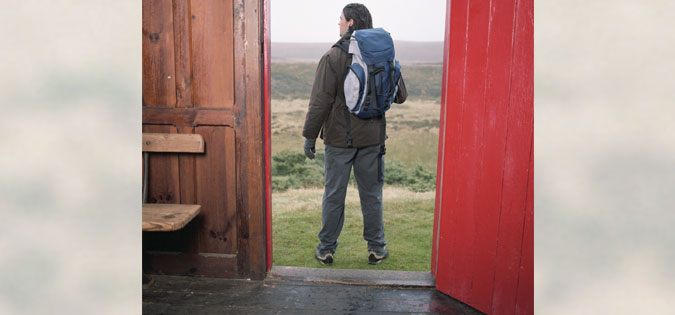 This post is based on Week Five of An Ignatian Prayer Adventure.
This post is based on Week Five of An Ignatian Prayer Adventure.
The Gospel stories of the call of the first disciples are often cited as models of the call to a religious vocation: an explicit call (“Come, follow me,” Matthew 4:19) and an immediate response that takes the form of leaving everything behind (“at once they left their nets;” “immediately they left the boat and their father,” 4:20, 4:22). In Luke’s version, they “left everything and followed him” (Luke 5:11).
Those of us who have not been called to a lifetime commitment in the religious life are nevertheless called to follow Jesus. The call may come in different forms at different times in our lives, and what we are called to leave behind may vary greatly.
Sarah, the wife of the Patriarch Abraham, was called to be a mother at the age of 90, and her first reaction was to laugh (Genesis 18:12). I thought of Sarah when, in my mid-70s, I was discerning a call to become a spiritual director, and my first reaction was to laugh. “Who, me?” Yes, said the Lord, and after three years of prayer and study, that is what I’m doing at age 80.
Major life changes often lead people to question what they are called to do. Retirement, the last child leaving home, the death of a spouse, or physical disability can all give rise to painful questions about who we are and what God wants of us now. The key word is now. Sometimes, in later life, we are called to things we might never have imagined. Some retired people experience grace in serving others; others find the time and space to experience prayer in a new and deeper way. It’s harder to hear the call in painful losses—of loved ones, of the ability to do various things, even of independence—but it’s there. Every major turning point in our lives is a call to renew our commitment to a God-centered life and to find God in all things. Part of our answer to the call—at any age, in any form—is a commitment to share in the sufferings of Jesus.
What do we have to leave behind in order to answer the call? At a recent meeting of a prayer group composed of retired people, several members expressed discomfort with the phrase “left everything.” Some pointed out that leaving everything when one has family responsibilities is irresponsible. What, then, is the nature of the call? Perhaps we are being called to leave behind not our homes or families, but whatever it is that holds us back from a fuller and deeper relationship with God. It may be an attachment to something material, or it may be a longstanding, deep-seated grievance that we need to let go. If we respond to the call to let go, to free ourselves to hear God’s call, we can realize, with the amazement of Sarah and Abraham, that God is full of surprises.
Who, me? Yes, you!



Great reflection!
Reminds me of John 15:16. “You did not choose me, I chose you.”
God bless.
Good Morning Barbara Lee, Forgive me, at age 76, I am still working on being humble. Being on a technically challenged journey to sainthood (get it? humble/saint LOL), please help me. In Gen 18:12, when Sarah says “lord” (KJV) is she referring to Abraham? Thank you for this eye opening message.
Jesus’call is so gentle, never forceful, but an invitation to let go of all that pulls me down. Thank you for the thought provoking article.
Just beautiful! Like CR above, I never looked at leaving everything, like a grudge, etc which holds you back from God’s embracing plans for you.
For many years I’ve thought about Mr. & Mrs. Zebedee and the impact their sons’ newfound vocations had upon them. Mr. Zebedee was left to do all the fishing, net mending and boat upkeep on his own at a time in his life when he should have been handing more responsibilities over to his sons. And what of Mrs. Zebedee? Back at home making her stew and flatbread. What was her reaction when her husband returned at the end of the day without their sons? Did they grieve their sons’ departure? What became of the family after Jesus’ death and resurrection? Answering Jesus’ call has always had a ripple effect, I’m guessing.
I was fortunate to study to become a spiritual director in 2012 after a sudden onset chronic physical illness with mental health complications. The past year or so, my illness which was supposed to get better, has gotten worse. I have gotten stuck in a pain/shame/blame cycle, and have cried out to God in the darkness so much with no answers, that I stopped crying. I even felt like I had lost my compassion for myself and for others. Thank you for your reflection. It reminds me of going back to the basics of the Ignatian Examen… what is God calling me to? What gives me joy, life? … What is God asking me to give up? What are the expectations, thoughts, demands I make of myself and God that keep me from experiencing God’s grace? Where/how might God still be trying to find me while I am crying in the darkness of my anger and despair? Do I still believe/trust that God, even now, has an invitation or call for me? God will always continue to give us the freedom to follow or to give up hope, especially during these transition times. Thanks again for this reflection as Holy Week approaches, and we are asked again if we will walk the way.
It has finally gotten thru to me that God isn’t finished with us no matter how old we are. At 77 He keeps nudging me! Liked ‘‘tis post. Thanks.
“Who, me ? Yes you !
Surely not me ?
Really ?
So thought provoking…
Thanks Barbara.
PS honestly me ? !
I really enjoy your articles – especially this one. I guess there is something in turning 77 and the second year of my journey to be a spiritual director.
I now have a new perspective on this Gospel reading. I did not
realize that Jesus also meant to leave behind a burdensome grievance that may be weighing us down… C
Love this!